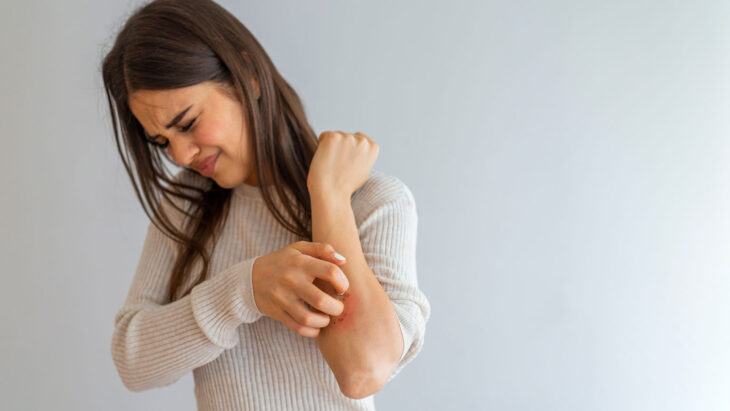October is Eczema Awareness Month, a timely reminder that this common skin condition affects more than 30 million Americans. While anyone can experience eczema, research suggests that women may face unique challenges.
WHAT IS ECZEMA?
Eczema is an inflammatory skin condition that causes redness, itching, dryness and sometimes cracking. It’s not contagious, but it can impact self-confidence and quality of life.
WHY WOMEN ARE AFFECTED DIFFERENTLY
- Hormones play a role: Fluctuations during menstrual cycles, pregnancy and menopause can trigger flare-ups.
- Lifestyle stressors: Balancing work, family and caregiving responsibilities may increase stress-related flare activity.
- Skin barrier differences: Some studies suggest women’s skin barrier function is more sensitive, leading to greater irritation.
TIPS FOR MANAGING ECZEMA
- Keep showers short and use lukewarm water.
- Moisturize immediately after bathing.
- Choose fragrance-free skincare products.
- Manage stress with rest, exercise or mindfulness practices.
- Work with a dermatologist to find the right treatment plan.
Eczema may not be curable, but it is manageable. Small changes in routine can make a big difference.
MORE THAN SKIN DEEP
Many women share that flare-ups affect more than their skin. They impact sleep, clothing choices and even social interactions. Recognizing this connection helps bring compassion and better care to those living with eczema.
ECZEMA DO’S & DON’TS
Do:
- Moisturize daily, especially after bathing
- Wear soft, breathable fabrics like cotton
- Use gentle, fragrance-free cleansers
- Manage stress through exercise, sleep or meditation
Don’t:
- Take long, hot showers
- Scratch irritated areas (keep nails short)
- Use harsh soaps or detergents
- Ignore persistent symptoms; see a medical professional
COMMON TRIGGERS FOR WOMEN
- Hormonal shifts (cycle, pregnancy, menopause)
- Stress (work-life balance, caregiving)
- Environment (weather changes, allergens)
- Products (makeup, fragranced skincare)
FAST FACTS ABOUT ECZEMA
- Affects 1 in 10 Americans
- More common in women during adulthood
- Symptoms often start in childhood but can appear later
- Not contagious, but can impact confidence and mental health
- Small lifestyle changes can reduce flare-ups and improve daily comfort.



